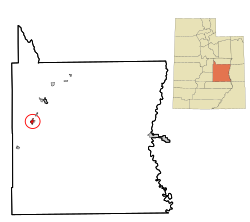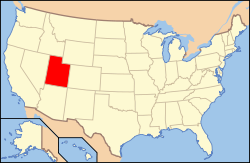Ferron, Utah
| Ferron, Utah | |
|---|---|
| City | |

Originally a Presbyterian school, this Ferron landmark has been home to American Legion Post 42 since 1942.
|
|
 Location in Emery County and the state of Utah |
|
 Location of Utah in the United States |
|
| Coordinates: 39°5′27″N 111°7′59″W / 39.09083°N 111.13306°WCoordinates: 39°5′27″N 111°7′59″W / 39.09083°N 111.13306°W | |
| Country | United States |
| State | Utah |
| County | Emery |
| Named for | Augustus D. Ferron |
| Area | |
| • Total | 2.2 sq mi (5.6 km2) |
| • Land | 2.2 sq mi (5.6 km2) |
| • Water | 0.0 sq mi (0.0 km2) |
| Elevation | 5,971 ft (1,820 m) |
| Population (2010) | |
| • Total | 1,626 |
| • Density | 759/sq mi (293.0/km2) |
| Time zone | Mountain (MST) (UTC-7) |
| • Summer (DST) | MDT (UTC-6) |
| ZIP code | 84523 |
| Area code(s) | 435 |
| FIPS code | 49-25180 |
| GNIS feature ID | 1441026 |
| Website | www |
Ferron is a city in Emery County, Utah, United States. The population was 1,626 at the 2010 census.
Ferron was originally populated by Mormon settlers in 1877.Three families responded to a call from the LDS Church asking to settle in the Castle Valley. They started on November 15, 1877 and arrived about 21 days later. The group spent time creating dugouts and later made their living in farming. Although settled in late 1877 the town had received its name sometime in the late 1860s to early 1870s when a government surveyor was sent under the homestead act to survey the area. The surveyor's name was Augustus D Ferron and, as the tale goes, the agreed to name the creek they camped by Ferron's Creek if he would agree to a "dunking" in the creek. He did so and the creek was then known as Ferron's Creek. Later when the town was settled the "s" was dropped from the name and the creek and town became known as "Ferron".
Ferron is in western Emery County, along Utah State Route 10, which leads northeast 11 miles (18 km) to Castle Dale, the county seat, and southwest 14 miles (23 km) to Emery. According to the United States Census Bureau, Ferron has a total area of 2.2 square miles (5.6 km2), all of it land.
As of the census of 2000, there were 1,623 people, 512 households, and 415 families residing in the city. The population density was 728.8 people per square mile (281.0/km²). There were 585 housing units at an average density of 262.7 per square mile (101.3/km²). The racial makeup of the city was 97.78% White, 0.25% African American, 0.31% Native American, 0.31% Asian, 0.43% from other races, and 0.92% from two or more races. Hispanic or Latino of any race were 1.60% of the population.
...
Wikipedia
